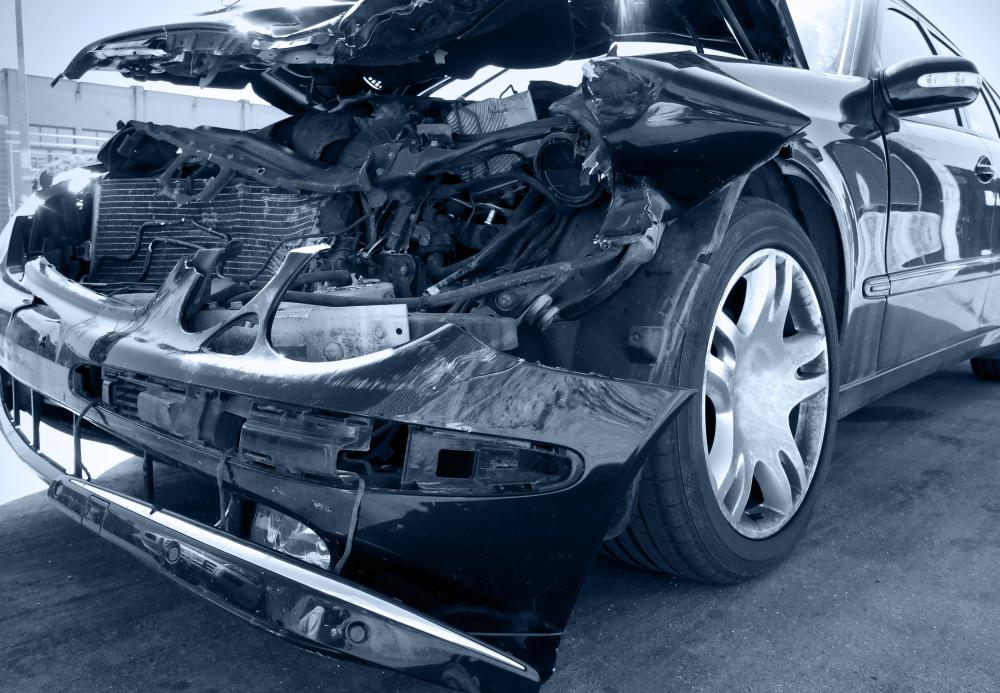At WiseGEEK, we're committed to delivering accurate, trustworthy information. Our expert-authored content is rigorously fact-checked and sourced from credible authorities. Discover how we uphold the highest standards in providing you with reliable knowledge.
What is a Total Loss?
An automobile is declared a total loss by the insurance company when the cost of repairing it after an accident or other covered event exceeds the car’s actual cash value (ACV), or when it wouldn’t be safe to drive even after repairs are completed. Total loss, or totaled, vehicles are sold for salvage, and the insurance company pays the car’s ACV to the owner, lienholder, or combination of the two. Policyholders whose cars are totaled can negotiate with the insurance company for the ACV, but are second in line behind lienholders for payment. Although commonly understood to be a characterization of the car’s road-worthiness, declaring a car a total loss is actually more of an economic declaration than a mechanical diagnosis.
When an insurance company exercises its right to declare a car totaled, it’s simply protecting its own economic interest. From the insurance company’s perspective, paying more to repair a car than it’s worth is unjustified for economic reasons. In fact, in some cases, insurance companies will use the ACV of the car less reasonable salvage costs as the cap on repair costs. For instance, if the car’s ACV is $8,500 US Dollars (USD) and reasonable salvage value is $400 USD, the car will be declared a total loss if the estimated repair costs exceed $8,100 USD.

Upon declaring a car a total loss, the insurance company will estimate the ACV and make an offer to the policyholder, who can accept it or negotiate a different value. It’s generally recommended that policyholders negotiate the ACV on a totaled car, because as a general rule, insurance companies will make a conservative initial offer. If the policyholder can prove that the ACV is higher, based on actual sales in the area and on guidebook price ranges, she should be able to realize a substantially better second offer.

Once the insurance company and the policyholder have reached an agreement on the ACV, the insurance company pays it out, less the policyholder's deductible. Lienholders listed on the car’s title are paid first, to the extent of the outstanding debt. Whatever money is left over is paid to the policyholder. If the ACV is insufficient to satisfy the lienholder’s claim — the total outstanding debt that’s secured by the car — then the policyholder is responsible to pay off the balance. The insurance company will alert the appropriate state motor vehicle department, triggering the creation of a new title document called a salvage title, which will alert potential buyers that the car’s been declared a total loss.

The car itself is generally sold to a salvage yard, which will try to recoup its cost by selling the working parts of totaled cars. Most totaled cars have some serviceable engine parts, such as the engines themselves, alternators, and transmissions. In addition, if the tires are in decent condition, they’ll be taken off and sold to a used tire distributor. Items like radios and global positioning systems (GPS) are also removed and put up for sale, and even intact body parts like bumpers, fenders and windshields may be removed and sold. If all the serviceable parts removed from the totaled car sell, the salvage yard will receive far more than the salvage fee it paid out for the car; whatever isn’t sold is crushed and sold for scrap.
AS FEATURED ON:
AS FEATURED ON:













Discussion Comments
My dad goes to a lot of car auctions in the area, and he tells me that some of the vehicles for sale have actually been declared a total loss by insurance companies, but a private mechanic will make enough repairs to get them back on the road. It's not supposed to work that way. A total loss vehicle is supposed to be recorded as inoperable and sold as salvage only.
Some total loss cars, however, aren't damaged beyond repair, and unscrupulous sellers can try to pass them off as legal used cars.
It seems to me that a lot of insurance companies are eager to declare a car to be a total loss these days. Back when I started driving, in the early 1970s, my insurance company wouldn't declare a wrecked car a total loss unless the frame was bent beyond repair. Just about any other kind of damage was viewed as repairable, so the insurance company would pay the repair shop and raise my premiums.
A few years ago, I got into a minor car accident in a brand new vehicle. I drove into the side of another car that went through a red light. My air bags deployed, although the speed was just barely 30mph. My front bumper got pushed back a few inches from the impact. In my mind, it could have been towed to a shop and hammered back into shape. The radiator was cracked, but the engine still started and ran.
Instead, the insurance company decided the damage went behind the "apron", and it declared the car a total loss. I didn't have gap insurance, so the insurance check for ACV went straight to the car dealership and we still owed $1200 on the loan. Gap insurance would have paid the difference.
Post your comments